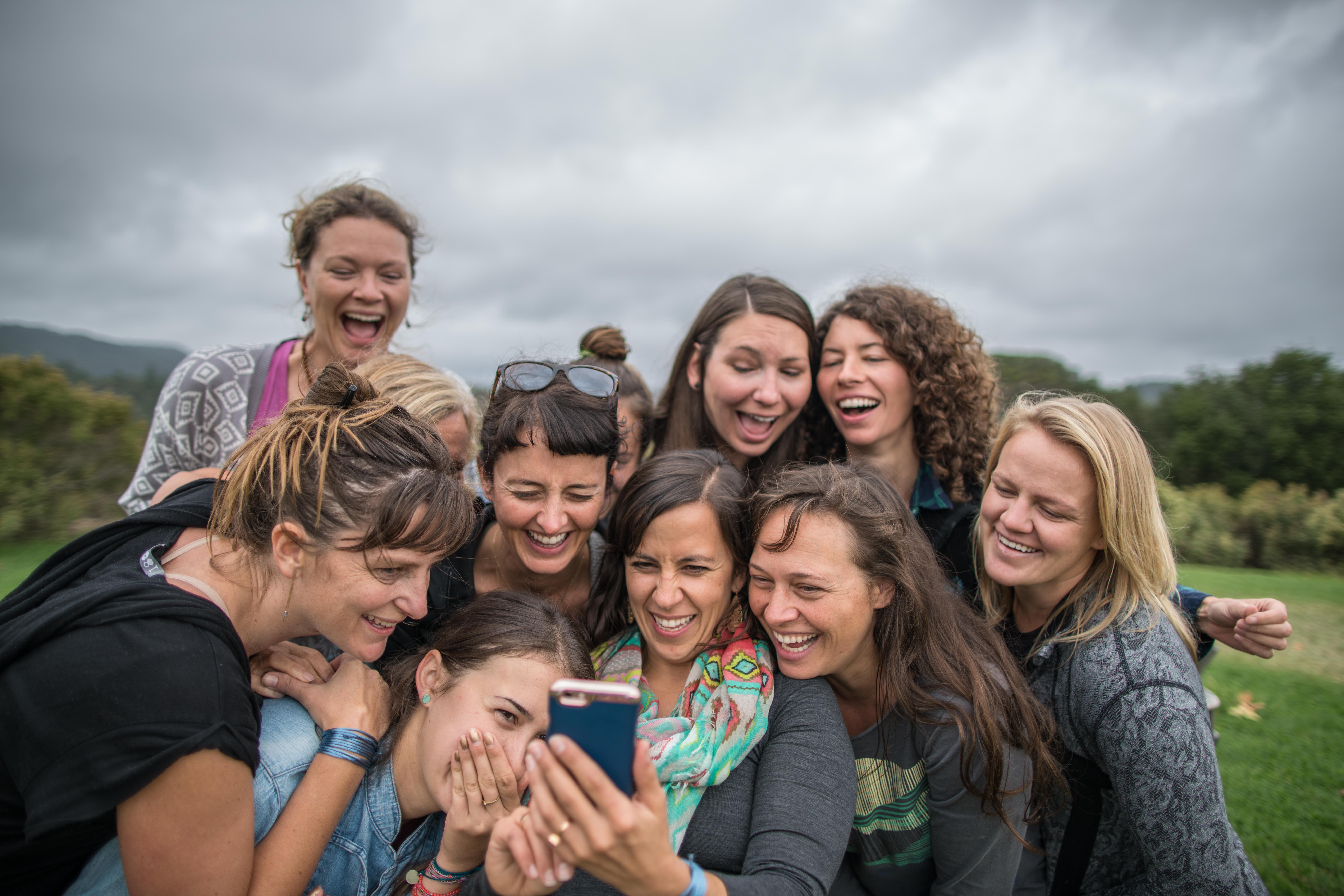Playful Photo From a Be Luminary Retreat
I returned a couple of weeks ago from a 16 day wilderness trip paddling down the Colorado river through the Grand Canyon. It was a magical trip for so many reasons. But the thing I loved most about this trip is that I could let go of the demands of daily life, the to-do list, the striving, the productivity, the ‘adulting’—and just PLAY. Adventures and games and cannonballs and pool toy floats and silly costumes and dance parties and a million things to explore.
We played almost constantly. Most of our days were centered around how much fun we could have and just how silly we could be. It was so delightful.
This is one of the things I loved so dearly about guiding multi-day wilderness whitewater trips (my summer gig for most of my 20s)—the chance to help people of all ages play like children. The sacred job of helping those entrusted to my care for the day or week open to joy. To help them empty their days enough and let go of productivity long enough, that play and joy had room to spring up.
But despite what I know about play and how much I love it, in my typical daily life it can be really hard to convince myself to carve out precious time for play–something that is by definition a productivity-free activity. The pressure to be productive and the other demands of life often seem way more important. Or sometimes I spend so much of my day being productive that I have a hard time lightening up or exerting any more energy to play. Can you relate?
The Surprising Benefits of Play
You know what was most striking though when I returned after nearly 3 weeks of doing nothing “productive”? I felt a more balanced and easeful productivity when I got back to work! Not to mention I felt way more relaxed, creative, clear, inspired, light-hearted, and peaceful. I felt more, not less, of these things after letting go of the demands of daily life for that big chunk of time. And the backlog of work I came home to paled in comparison to how nourished I felt.
It’s a lesson I’ve learned before, but it was so timely to learn it again. Because my mind often tells me that if I don’t finish that to-do list and don’t constantly keep up with all my responsibilities, that I will get too overwhelmed. The problem with this thinking is that there is always more to do. I never arrive at the magical end of my to-do list–at least not for long. So if I listen to this logic it leads to a hamster wheel effect where I am constantly running and never stopping to rest, rejuvenate, reflect, play, and simply be present.
And I’m not alone. So many of us think of play as optional or unnecessary. It’s kind of an epidemic these days. But research supports the opposite–it’s actually biologically necessary. It’s a hardwired human need. As Brenè Brown explains in her book The Gifts of Imperfection, play “shapes our brain, helps us foster empathy, helps us navigate complex social groups, and is at the core of creativity and innovation.”
So if you want to be more creative, do better work, experience more connection, and feel more joy, the prescription is PLAY!
Defining Play
I think it’s important at this point to define play. Because if you are anything like me, you will try to sneak productivity into your play or multi-task with other things you need to do.
Dr. Stuart Brown, a physician, psychiatrist, clinical researcher and the founder of the National Institute for Play, defines play with the following criteria. Play is:
-
- Apparently purposeless – It’s done for it’s own sake.
- Voluntary – It’s not obligatory or required.
- Inherently attractive – You inherently want to do it, it’s fun, it makes you feel good, it provides psychological arousal.
- Freedom from time – You lose a sense of the passage of time when you are doing it.
- Diminished consciousness of self – You stop worrying about if you look good or awkward, smart or stupid while doing it.
- Improvisational potential – You aren’t locked into a rigid way of doing things, you are open to serendipity or chance.
- Continuation desire – You want to keep doing it. And the pleasure of doing it drives that desire
So as you can see looking at the criteria above, activities we think of as play, can be far from it depending on how we are approaching the activity. If you are “playing” a board game with your kids, but watching to clock the whole time, that’s not play for you. If you are “playing” frisbee, but only because you need to get exercise today, that’s not play for you. Or if you are creating art only because you have to for your job, that wouldn’t count either. But we’ve all experienced true play where we become totally engrossed, lose track of time, and get lost in the joy of whatever we are doing.
Common types of play include:
-
- Joking around (i.e., babytalk or telling jokes)
- Movement and physical games (i.e., dancing or doing cartwheels)
- Competition and challenges (i.e., competitive sports)
- Organizing and carrying out enjoyable social experiences (i.e., dinner parties)
- Collecting things (i.e., beautiful or interesting objects or experiences)
- Art and creativity (i.e., joy found in making things)
- Storytelling (i.e.,using our imagination to tell stories orally or in written form).
Which thing(s) on this list do you most enjoy?
Also, it’s helpful to note that play is not the opposite of work. Creativity and innovation are both a kind of play and a bi-product of play. So those things can be integrated into any work you do. Great news, right?
Cultivating More Play
Most of the women we work with tell us they want to play more and feel more lighthearted. So you are in great company if these are things you long for too. There are lots of great ways to cultivate more play in your life. Here are a few of our favorites:
1. Practice shifting your perspective to think of play as essential to your health and functioning. Remember play is biologically necessary. It’s a hardwired human need.
2. Connect play with one or more of your values. Think about something you value deeply in your life (connection with others, creativity, joy, etc). Ask yourself: how does play move me closer to what I value most?
3. Write yourself a “play permission slip” and stick it somewhere you’ll see it. Give yourself permission to be playful, to be a beginner, to be uncool and to not be in control all the time. And also to not be funny or playful when that’s not how you feel.
4. Take your play history. This is an activity I discovered from reading Dr Stuart Brown’s insightful book on Play. The purpose of this activity is to get us back in touch with the joy we have experienced at various points in our lives with play. And learn what our preferences and strengths are in regards to play. So we can leverage them to experience lots of joy, lightness, and laughter in our lives. We all have different play styles and types of play we enjoy most. So it’s really important to know what play looks like for you.
To take your play history reflect on the following questions. Then jot down some notes about what comes up for you in your journal.
-
-
- Spend some time thinking about what you did as a child that really got you excited and really gave you joy. Was it reading a comic book? Building a tree house? Making stuff with mom or dad?
- Did you like doing this with other people or solo? Or both?
- Were the things that really fueled you more mental or physical?
- Recall the feeling you had while playing whole-heartedly. Describe that feeling in detail. Use all of your senses.
- Write down any visuals that come to mind.
- What kind of play tends to light you up? What kinds of play are you most drawn to?
- How have those kinds of play manifested as you’ve grown?
- What could you do in your current life to increase play and joyful moments? To increase that playful feeling you experienced so fully as a child?
- What actions could you take? What activities would encourage this? What relationships or spending time with which people might increase your playful feelings?
- Spend some time thinking about what you did as a child that really got you excited and really gave you joy. Was it reading a comic book? Building a tree house? Making stuff with mom or dad?
-
5. Find one way to incorporate play into your life each day this upcoming week. And DO IT! Do some cartwheels, sing a song at the top of your lungs, tell a joke, talk in a silly voice, pump up the tunes, have an impromptu dance party, play frisbee, plan a dinner party or fun outing, make up a story, grab some paints and create for the sake of it, explore a new place, make something, laugh with someone, be goofy, be you. Make it unproductive, exploratory, and lighthearted. Whatever you choose to do, do it because you want to. And simply PLAY.
With Love,
Amber
Team Luminary


